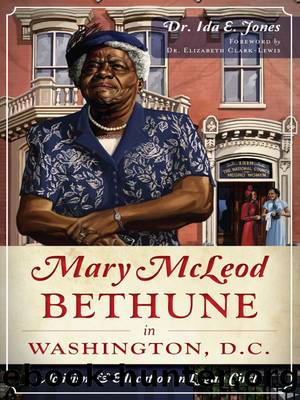Mary McLeod Bethune in Washington, D.C. by Ida E. Jones

Author:Ida E. Jones
Language: eng
Format: epub
Publisher: Arcadia Publishing
Published: 2013-10-15T00:00:00+00:00
Mrs. Bethune dedicates the Bailey Memorial Room at the NCNW house. Courtesy Mary McLeod Bethune Council House, NPS.
The dedication of Thurman to the archives initiative cultivated a âpreservation sensitiveâ culture within the NCNW. The NCNW affiliate organizations and membership were encouraged to celebrate living heroines as well as document achievements through publishing in the Telefact or Aframerican Journal or welcomed to submit items for deposit in the archives. In May 1946, Vivian Carter Mason instructed Bethune in a letter to secure permissions for a Wings Over Jordan radio program on which Thurman was scheduled to speak about NCNWâs archives. Mason also suggested that Bethune provide copies of program transcripts to be sent to ministers, school principals, organizational heads, librarians and newspapers.
The National Archives Day inaugurated the formal collecting of significant, unusual and rare documentary evidence of the accomplishments of Negro women in the development of the social, economic, political and cultural patterns of life. The desired end result was to spread knowledge about the contributions of Negro women whose pride, courage and impetus contributed to the development of Negro people. The national day would have a two-prong approach, a national and local structure. The national program involved:
Nation-wide hook-up on âThe Negro Woman Marches OnâââIn the Vanguard,â âNegro Women, Heroines Allâ as a theme on [popular] radio programsâ¦Ask national organizations such as the National Board of the YWCA, National Council of Jewish Women, National Council of Catholic Women, Federation of Womenâs Clubs, NAACP, National Urban League, the CIO of AFL, Federal Council of Churches, United Council of Church Women to observe in any way that they can National Archives Day. Especially, to publicize in their official organs a statement concerning the contributions of Negro women of yesterday and today (We can furnish suggested materials). Give releases to all newspapers. Ask women columnists to try [and] write an article or use some part of the material in their column that day or during the week.
The local program involved organizing listening parties around the national broadcast. Each council received a brochure, which they were encouraged to share with their ministers, local papers and schools. It was suggested that they host events in public school libraries or honor a local woman of past or present accomplishment to reinforce the importance of the archives. The event sought to promote the archives and NCNW as well as raise money for collecting materials.
On June 17, 1946, in an interview on WINX radio, Bethune spoke about the formation of Archives Day and explained its purpose:
National Archives Dayâa project designed to give impetus to the building of a National Museum at [the] Council Houseâwhere the records, letters, books, pictures, medals and other authentic materials, suggestive of the struggles and accomplishments of Negro women, can be assembled. We want, through such a collection, to tell in concrete form the story of the contributions of Negro women to American lifeâ¦As early as 1773, Negro women were active in our national life. Phyllis Wheatley, the first American Negro women poet, told in her volume of poems on various subjects of her contact with General George Washington.
Download
This site does not store any files on its server. We only index and link to content provided by other sites. Please contact the content providers to delete copyright contents if any and email us, we'll remove relevant links or contents immediately.
Down the Drain by Julia Fox(980)
The Light We Carry by Michelle Obama(899)
Cher by Cher(797)
Simple Passion by Annie Ernaux(747)
Love, Pamela by Pamela Anderson(602)
The Nazis Knew My Name by Magda Hellinger & Maya Lee(579)
Zen Under Fire by Marianne Elliott(564)
You're That Bitch by Bretman Rock(551)
Novelist as a Vocation by Haruki Murakami(542)
Alone Together: Sailing Solo to Hawaii and Beyond by Christian Williams(532)
The Foxfire Book of Appalachian Women by Kami Ahrens(531)
Kamala Harris by Chidanand Rajghatta(496)
Gambling Man by Lionel Barber(488)
The Barn by Wright Thompson(437)
Drinking Games by Sarah Levy(429)
A Renaissance of Our Own by Rachel E. Cargle(418)
Limitless by Mallory Weggemann(417)
Memoirs of an Indian Woman by Shudha Mazumdar Geraldine Hancock Forbes(415)
A new method to evaluate the dose-effect relationship of a TCM formula Gegen Qinlian Decoction: âFocusâ mode of integrated biomarkers by unknow(415)
